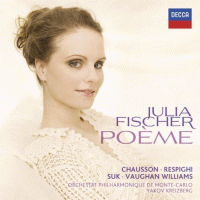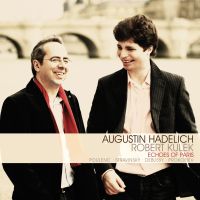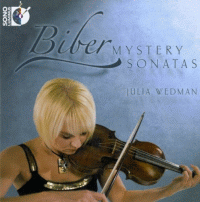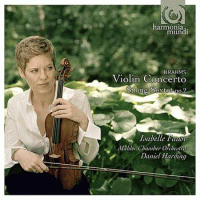


A portion of each purchase helps
support SFCV
It's spring, and the violins are blooming. Blooming so well, in fact, that they have the leisure to branch out. One of the things I like most about Isabelle Faust's new recording of the Brahms Violin Concerto is that the other half of the Harmonia Mundi disc is taken up with the same composer's second string sextet.
The performance of the concerto is fantastic. Anyone who's heard Faust will know what to expect in the way of technical control. Hardly anyone is going to expect the first-movement cadenza, which is Ferrucio Busoni's, and has a hearty and very prominent timpani presence, augmented a bit further on by other musicians.
Daniel Harding and the Mahler Chamber Orchestra (the silliest name I've heard for an ensemble since "Borodin Trio," but I digress) do a magnificent job. If I didn't know how small the band was — the entire complement is listed by name in the booklet — I'd have assumed it was twice the size.
The sextet, meanwhile, gets the best performance I think it has had in some time. The piece itself is among the best things Brahms ever wrote, which some people may not realize since it's an early work. The first movement is one of those Brahmsian epics; the second a taut scherzo with a sort of pub brawl as trio; the third the most explicit depiction of the way from purgatory to paradise I've ever seen spelled out in notes. After that, a well-deserved romp.
But Faust's is hardly the only remarkable violin recording to come to my attention in the last month; they seem to be as prolific as young plants after the winter of a La Niña.
Vadim Gluzman, like Faust, joined a concerto recording to a chamber work. The concerto is Max Bruch's first, which needs no introduction; the chamber work is Bruch's string quintet, which likely does. I doubt it's ever in its existence been played so well as this, with Gluzman as first violin and Maxim Rysanov as first viola. It still sounds like something you can't imagine having been written in 1918, as it was, but this is the first time I've listened to it and wanted to hear it again.
Meanwhile, the Bruch Concerto is the best performance I've heard in a long while — not just for the spitfire solo playing, but for the accompaniment, by the Bergen Philharmonic Orchestra under Andrew Litton. I didn't know you could get so much detail into that piece. In between the concerto and the quintet comes the Romanze, here in its violin version, and played so well that even this violist doesn't miss the viola original.
Daniel Hope's new recital also happens to lead off with the first Bruch concerto, but otherwise it's a different sort of project. It's a compendium of music associated with one of the 19th century's most famous virtuosos, Joseph Joachim — music he edited, premiered, or wrote. If you've read much about Joachim, best known as the guy for whom Brahms wrote his Violin Concerto and Double Concerto, you'll understand that there's much to pick from. But in addition to a couple of pieces of Joachim's own, there are things from the outskirts of the circle, so to speak: a Romance by Clara Schumann; Schubert's Auf dem Wasser zu singen (To be sung upon the water); and — a lovely touch — Brahms' Geistlisches Wiegenlied (Sacred lullaby) with Hope playing the viola obbligato as Joachim did, and Anne-Sofie Von Otter supplying the most amazing cameo in my memory.
Vadim Repin's most recent recital, with Nikolai Lugansky, looks from the front cover as though it's going to proceed along orthodox lines: sonatas by Franck, Grieg, Janáček. But it's the Janáček — a taut and obstreperous little piece — that comes first, and the Grieg isn't the luscious and popular Third Sonata, but the second. The Franck is fantastic, but then there's hardly a recorded performance of the piece that isn't. More to the point is that the Janáček is fantastic. That's not all that common.
Julia Fischer has managed to put together a disc that could reasonably be titled Poème without anyone thinking it silly. Yes, Ernest Chausson's piece of that title is in there, and so is Vaughan Williams' The Lark Ascending. But so also are Ottorino Respighi's Poema autunnale and Josef Suk's Fantasy. The former opens with a feast of violin fourths that you'd assume belonged to the Lark, while the latter would be the ideal item for a guess-the-composer quiz. Fischer, with typical class, put the Respighi and the Suk first and second.
Augustin Hadelich's first recital for Avie, the unaccompanied Flying Solo, was such an astounding recording that I did not expect him to better it. Even now I'm not sure he has; but in the successor recital, Echoes of Paris, he has accomplished one miracle: he's made a recording (with Robert Kulek) of Francis Poulenc's violin sonata in which nothing sounds ugly or brutal. After that, playing the pants off the original Pulcinella Suite of Stravinsky — the Kochanski version, not the Dushkin — is practically a dawdle, while the Debussy Sonata and the Prokofiev D-Major to follow are in foregone-conclusion territory.
And Julia Wedman, with a four-strong continuo team, has just made the best recording of Heinrich Biber's Rosary Sonatas I've heard in a couple of decades. If you don't know these Baroque masterpieces, you should; and here's your chance.

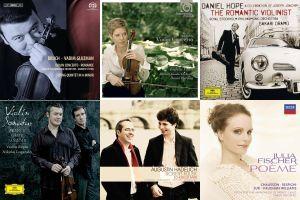
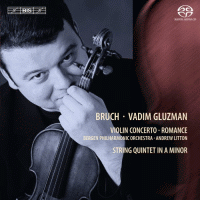
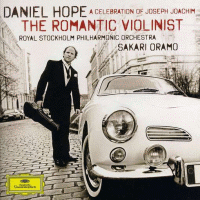
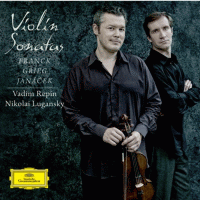 Janáček: Sonata for Violin and Piano, Allegretto
Janáček: Sonata for Violin and Piano, Allegretto